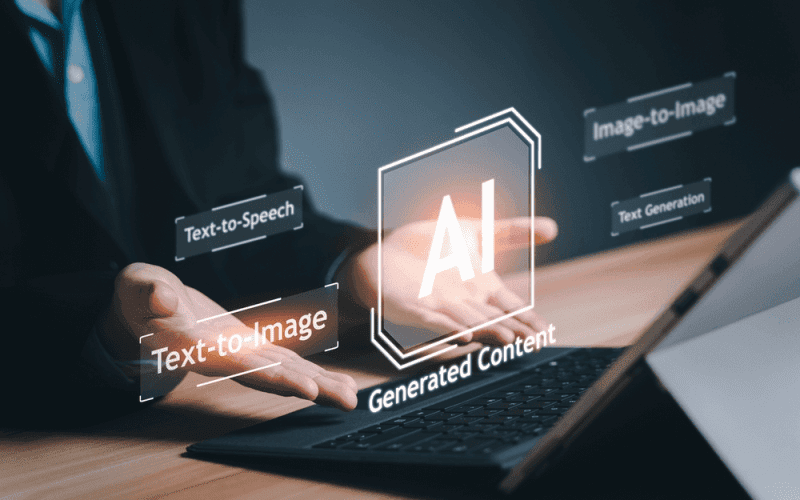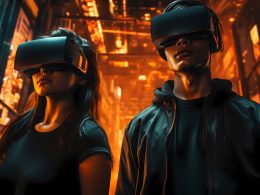Introduction
In an era where digital content is king, the Role of AI in Content Creation has emerged as a pivotal factor in shaping the landscape of media, marketing, and communication. Artificial Intelligence (AI) has revolutionized the way content is generated, distributed, and consumed, offering unprecedented opportunities and posing significant challenges. This comprehensive article delves into the multifaceted impact of AI on content creation, examining both its benefits and potential pitfalls.
Understanding AI in Content Creation
Artificial Intelligence, at its core, involves the development of computer systems capable of performing tasks that typically require human intelligence. These tasks include learning, reasoning, problem-solving, perception, and language understanding. In the context of content creation, AI encompasses a range of technologies, including natural language processing (NLP), machine learning, and deep learning, which enable machines to generate, analyze, and optimize content.
The Benefits of AI in Content Creation

- Efficiency and Productivity: One of the most significant advantages of AI in content creation is its ability to enhance efficiency and productivity. AI-powered tools can automate repetitive tasks, such as data entry, proofreading, and formatting, allowing content creators to focus on more strategic and creative aspects of their work. For instance, AI-driven platforms like Grammarly and Hemingway Editor assist writers in refining their prose by identifying grammatical errors and suggesting improvements.
- Personalization: AI enables the creation of highly personalized content tailored to individual preferences and behaviors. By analyzing vast amounts of data, AI algorithms can identify patterns and trends, allowing marketers to deliver targeted content that resonates with specific audiences. This level of personalization enhances user engagement and drives higher conversion rates. Netflix and Spotify are prime examples of companies leveraging AI to recommend content based on user preferences.
- Scalability: AI empowers content creators to scale their efforts without compromising quality. Automated content generation tools, such as OpenAI’s GPT-3, can produce articles, blog posts, and social media updates at an unprecedented scale. This scalability is particularly valuable for businesses seeking to maintain a consistent online presence and engage with a global audience.
- Data-Driven Insights: AI-driven analytics tools provide valuable insights into content performance, enabling creators to make data-informed decisions. By analyzing metrics such as click-through rates, engagement levels, and audience demographics, AI can identify what works and what doesn’t, guiding content strategy and optimization. Tools like Google Analytics and HubSpot leverage AI to offer actionable insights for content marketers.
- Creative Assistance: AI is not limited to mundane tasks; it can also serve as a creative partner. AI-powered design tools, such as Canva and Adobe Sensei, assist designers in generating visually appealing graphics and layouts. Furthermore, AI-driven music composition tools like Amper Music and AIVA (Artificial Intelligence Virtual Artist) enable musicians to create original compositions, expanding the horizons of creative expression.
The Challenges and Ethical Considerations

While the Role of AI in Content Creation offers numerous benefits, it also presents several challenges and ethical considerations that must be addressed.
- Quality and Originality: One of the primary concerns surrounding AI-generated content is the potential compromise of quality and originality. While AI can produce coherent and grammatically correct text, it may lack the depth, nuance, and creativity that human writers bring to the table. There is a risk of content becoming formulaic and devoid of unique perspectives, leading to a homogenization of digital media.
- Bias and Fairness: AI algorithms are only as good as the data they are trained on. If the training data contains biases, the resulting content may perpetuate those biases. This can lead to the dissemination of discriminatory or misleading information, exacerbating existing societal inequalities. Ensuring fairness and transparency in AI-generated content requires rigorous oversight and the implementation of ethical guidelines.
- Job Displacement: The automation of content creation tasks raises concerns about job displacement and the future of human creativity. As AI tools become more advanced, there is a fear that human writers, designers, and marketers may be rendered obsolete. However, it is essential to view AI as a complementary tool rather than a replacement, enabling humans to focus on higher-order tasks that require emotional intelligence and critical thinking.
- Intellectual Property and Plagiarism: The use of AI in content creation raises questions about intellectual property and plagiarism. If AI generates content based on existing works, it may inadvertently infringe on copyright laws. Establishing clear guidelines and legal frameworks to address these issues is crucial to protect the rights of content creators and ensure ethical use of AI.
- Dependence on Technology: Over-reliance on AI for content creation can lead to a loss of human touch and authenticity. Authenticity is a key factor in building trust and credibility with audiences. Striking a balance between leveraging AI for efficiency and maintaining a genuine human connection is essential for effective content creation.
The Future of AI in Content Creation

The Role of AI in Content Creation is poised to evolve further, driven by advancements in technology and changing consumer expectations. Here are some potential future trends:
- Enhanced Collaboration: The future of content creation will likely see increased collaboration between humans and AI. AI tools will serve as creative partners, augmenting human capabilities and enabling more innovative and impactful content. This symbiotic relationship will redefine the boundaries of creativity and productivity.
- Contextual Understanding: AI’s ability to understand context and generate content that aligns with specific cultural, social, and emotional nuances will improve. This will result in more relevant and engaging content that resonates with diverse audiences on a deeper level.
- Ethical AI Development: As awareness of ethical considerations grows, there will be a greater emphasis on developing AI systems that prioritize fairness, transparency, and accountability. Ethical AI frameworks will guide the design and deployment of content creation tools, ensuring responsible use of technology.
- Interactive and Immersive Content: AI will play a crucial role in creating interactive and immersive content experiences. Virtual reality (VR), augmented reality (AR), and interactive storytelling will become more prevalent, offering audiences new ways to engage with content. AI-driven personalization will enhance these experiences, making them more tailored and immersive.
- Continued Innovation: The rapid pace of AI innovation will lead to the development of new tools and technologies that push the boundaries of content creation. From advanced language models to AI-generated videos and animations, the possibilities are limitless. Content creators will have access to a diverse array of tools that enable them to experiment and innovate.
Conclusion
The Role of AI in Content Creation is undeniably transformative, offering a plethora of benefits while posing significant challenges. As AI continues to evolve, it is imperative to strike a balance between leveraging its capabilities and addressing ethical considerations. By embracing AI as a complementary tool and fostering collaboration between humans and machines, we can unlock new levels of creativity, efficiency, and personalization in content creation. The future of content creation lies in harnessing the power of AI responsibly, ensuring that it serves as a force for good in the digital age.












